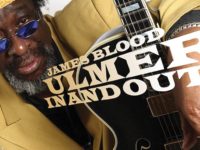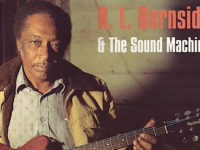There probably isn’t a guitarist today who is at once rootsy, complex and yet under-noticed as James Blood Ulmer. He stands at the juxtaposition of so many styles that he cannot be put neatly in a single one of those.
His uniquely scrabbling guitar attack, as once described by Village Voice music critic Greg Tate, is “the missing link between Jimi Hendrix and Wes Montgomery on one hand, between P-Funk and Mississippi Fred McDowell on the other.” Ulmer has a gruff singing style to match his axe playing, weary but full of old-school attitude.
When you examine his long and extensive background, you begin to understand how Ulmer got to pull together so many disparate varieties of music together. In the ’60s, he played R&B and funk in juke joints across the Midwest. He played for organ man Big John Patton and legendary drummer Art Blakey. But then he also served under Rashied Ali and Ornette Coleman. He’s likewise played with Ronald Shannon Jackson and David Murray.
The association with Coleman has had a huge impact on Ulmer’s approach to music, and you can still find traces of harmolodics in everything he plays. Tales of Captain Black, James Blood Ulmer’s first solo LP from 1978, is virtually a Prime Time date, and one of their better ones at that.
After all that I just said, you’d think that this is a lead-up to yet another whack jazz record review. Nope, not this time. Instead, this is about perhaps the best blues release of 2007.
Released on May 8, 2007, Bad Blood in the City: The Piety Street Sessions was a record I’d been admittedly a little late in picking up on. Maybe I subconsciously thought that all that was needed to be sung about Hurricane Katrina’s impact on New Orleans had been done quite well by then. I should have known better; this conversation is not complete without Blood’s input.
Like many other musicians affected by the tragedy of seeing a great city and many of its residents left festering underwater for days, James Blood Ulmer put pencil to paper and immediately penned several songs to express his sadness, anger and frustration at the calamity. But he didn’t lay down these tracks until December 2006 in a marathon three-day session.
Waiting almost two years after the hurricane ravaged New Orleans made more sense, as explained by second guitarist and producer Vernon Reid of Living Colour fame. As media and government attention subsided over time, this record served to keep people from forgetting about the victims.
Backed by Reid and other members of the band from his watershed Memphis Blood: The Sun Sessions blues recordings of 2001 and recorded in the Crescent City itself, the stage was perfectly set for raw, undiluted and passionate performances. And since Blood is raw, undiluted and passionate himself, he was clearly in his element for these recordings. And man, it shows.
“Survivors of the Hurricane” is a groove that sounds like a tamer descendant of the free funk Ulmer was playing in his post-Prime Time days. Tame, that is, until Reid cuts loose with an unhinged solo that harken back to his own Living Colour days. “Katrina” is an elegy of sorts, which like “Survivors” is Ulmer’s blunt account of the catastrophe. The simple blues verses rise up to climatic choruses while Blood’s disgust over the handling of the event culminates in a “talk to the president!” rallying cry.
“Let’s Talk About Jesus” is about James Blood Ulmer going back to his gospel roots to find redemption though the Son of Man (and a well played, B-3 organ). Irene Datcher supplies reaffirming supporting vocals in one of the more lively, upbeat tracks on Bad Blood in the City: The Piety Street Sessions. Meanwhile, the feisty, post-modern blues “Old Slave Master” mocks the belated help provided by the government.
Ulmer’s five fine new compositions are supplemented perfectly by six well-chosen covers. These borrowed songs are all distinct, all fit Blood’s style well and nearly all fall neatly within the whole Katrina theme.
“Sad Days, Lonely Nights” has all the mesmerizing swagger you’d expect out of a Junior Kimbrough tune, except that James Blood Ulmer adds even more. His voice shot all to hell from the hurried, late-night recording sessions only serves to bolster his sincerity in “keepin’ it real.”
John Lee Hooker’s “This Land Is Nobody’s Land” is a natural for Ulmer, as Ulmer’s blues is plainly indebted to Hooker. In this rendition, Ulmer and his band give it a spooky, voodoo flavor. “Dead Presidents” is the lighthearted break in the somber proceedings and Ulmer and his crew band give Little Walter a run for his … err … dead presidents.
Howlin’ Wolf is represented here, too, with his “Commit a Crime,” replete with Ulmer and Reid’s twin guitar assault. Next up to be represented is Son House, with “Grinnin’ In Your Face.” Charlie Burnham gives the tune a back porch quality with his fiddle and mandolin.
Bessie Smith’s “Backwater Blues” goes all the way back to the 1920s and with it being about the risks and adversity poor black people face living in flood-prone areas, it was just as relevant today as it was then. The song is rendered as a gentle, jazzy blues.
I always felt that the best blues draw heavily on tradition while speaking at a gut level to the concerns and conditions of the here and now. James Blood Ulmer stepped up to the plate and delivered just that with Bad Blood in the City: The Piety Street Sessions. He may not be from NOLA, but he proved here to be a true New Orleanian at heart.
- Ches Smith Quartet – ‘Clone Row’ (2025) - May 30, 2025
- James Brandon Lewis Quartet – ‘Abstraction Is Deliverance’ (2025) - May 27, 2025
- Soft Machine – ‘Drop’ (1971, 2025 remaster) - May 21, 2025




